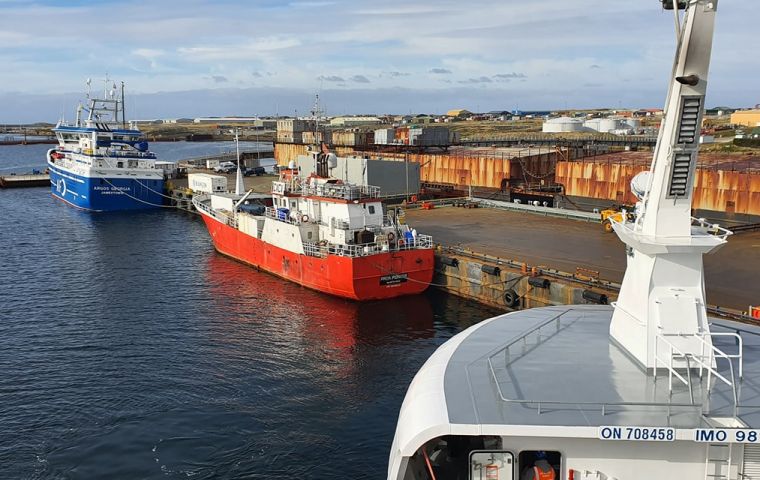MercoPress. South Atlantic News Agency
Falklands' fishing companies must deal with higher costs and falling prices for produce
 Bates said FIFCA was talking to its members “and all are working hard to manage the new situation we find ourselves in” (Pic Arvid Olai Mjønes - Fishing vessels along FIPASS)
Bates said FIFCA was talking to its members “and all are working hard to manage the new situation we find ourselves in” (Pic Arvid Olai Mjønes - Fishing vessels along FIPASS)The Falkland Islands Fishing Companies Association, FIFCA, Secretary James Bates said the sector faced difficulties and increased costs in the logistical and operational areas of the fishing businesses.
Bates said FIFCA was talking to its members “and all are working hard to manage the new situation we find ourselves in. We have excellent products and produce high quality food for the world. We have very long established and well-placed international partners, efficient distribution systems and we have in our companies the highest level of expertise in all areas of our market and operations.”
The current first Falkland Calamari season will end with around 26,000mt caught. While a lot less than in recent years if an annual average of 45,000 to 55,000mt is used, “we can say that this first season catch is around what would be ‘normal’,” assured Bates.
He added: “We won’t really have a clear view of the market demand or prices for some time yet, probably in late May. For Falklands Calamari, the main markets are Spain and Italy with other markets in the southern Europe such as Croatia also being important.
The restaurant and hotel trade, which is the most important in all of these countries, is closed. Retail trade has increased but probably not sufficiently to compensate. There are public reports of drops of 30% to 70% in overall demand/prices but in our view we need to see what actually happens in a month or so when our product is in the market.”
The Falklands' finfish product is mainly small sized hake and the season for that is just beginning, so supplies to the market will not really begin until later this year.
The market for this is mostly Eastern Europe, and the hake is low value, traditionally sold as consumer product with little transformation, mostly as bagged product to retail. Mr Bates said: “Again, it is not yet possible to be confident of the market position but given that it is an inexpensive product, it is likely that demand will be about normal.”
Mr Bates reiterated that the market for Toothfish was mostly suspended. Producers who have strong cash flow are putting their fish into cold store and waiting, while some are selling because they need to. “For the few consignments that are sold we hear prices of thirty percent less than applied not very long ago,” said Mr Bates.
He said there was a concern about the market structure’s ability to withstand the new pressures, and the disruption would almost certainly add additional costs.
Bates added there would be issues around finding new customers supporting existing customers with extended credit and all of the many other challenges in this complicated part of the sector.
“In our membership we have strong companies who are either producing or have access to the processing plants processing Falkland’s product for the retail market. Through these we have good access to supermarkets in the countries previously mentioned and this is an important strength.”
He said: “We are managing the market changes and the very challenging logistical and operational consequences of this situation.
Factors like vessel surveys, crewing for next season, spare parts, engineering support and provisioning the vessels will all be managed by our members. It is also very likely that there will be additional complications and costs on the discharge and storage of shipments on arrival in Europe.
“Freighting opportunities in the next months to get our products to markets will be another consideration. Unfortunately, the changing circumstances have impacted on the accessibility of containerization here. For the moment at least”
Bates pointed out that with the collapse in oil prices it is likely, “that we will see our bunkers reduce significantly, but there is always a time lag with this.”
He said however, “we believe that with the understanding and co-operation from FIG, in which the principles set out in the recently signed Accord are a good foundation, coupled with the significant strengths that we have, (good products, many years of top level seafood experience and supplying to our markets, sound international relationships, and a solid presence in all key markets), we will work our way through the challenges we face together.”
He added: “The new situation of course brings very serious challenges for FIFCA members, and we are very aware of the key role we play in our country’s economy. At the moment while we see the potential problems, we think more time is necessary before we can be clear about the actual impacts. We will continue to keep Government informed and look forward over the coming weeks to working with the Portfolio Holder and Officials to chart our way forward.” (Penguin News).-




Top Comments
Disclaimer & comment rulesCommenting for this story is now closed.
If you have a Facebook account, become a fan and comment on our Facebook Page!